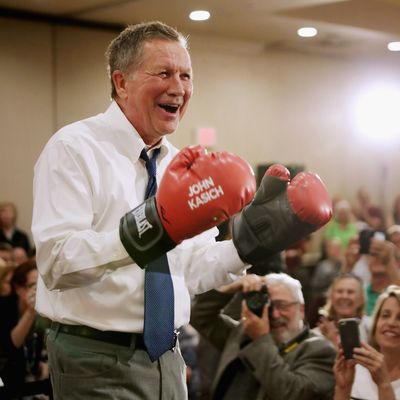
This week, five Republican governors bucked the party line, signing onto a bipartisan letter calling on Congress to abandon the GOP’s highly partisan drive to repeal and replace Obamacare, and instead work across party lines for incremental improvements in the health care system.
Needless to say, this was not the approved GOP message, and 4 of the 5 signatories represent states carried by Hillary Clinton. And then there is John Kasich of Ohio, who stands alone. He is from a state that Donald Trump won in November. But Trump did not win the Buckeye State in the primaries, because Kasich handed him a rare defeat there. And he neither supported nor voted for the 45th president in the general election (according to his own account, he wrote in John McCain’s name on his presidential ballot).
Right up until the point Trump registered his astonishing November win, Kasich was reportedly planning a big postelection speech that would have established him as a post-Trump party leader and probable 2020 candidate for president.
Needless to say, he canceled the speech. But speculation around Kasich’s presidential ambitions continued, if only because it was so easy to envision the possibility that Trump might hang it up after one term, resign even earlier than that, or perhaps even be removed from office. And unlike other major Trump rivals in 2016 who did well enough to pass the smell test, Kasich never made his peace with Trump or deferred his dreams until a more distant future (it’s worth noting that Kasich will turn 68 in 2020, while Ted Cruz and Marco Rubio will still be in their 40s).
So any thoughts of a 2020 primary challenger to Trump must begin with John Kasich, who won’t have to creep his way out of the president’s tent.
Kasich is term-limited in 2018. Being from William Tecumseh Sherman’s home state, Kasich knows how to avoid a so-called “Sherman Statement” ruling out a run for any other office. He has not made, or suppressed, any future presidential ambitions. In a book he published a few months ago (with the decidedly un-Trumpian title Two Paths: America Divided or United), Kasich dropped a hint, according to a review appearing in the Cincinnati Enquirer:
He [ends] the book with a letter to his daughters, whose first presidential election as voters will be in 2020. “I want to do everything I possibly can to ensure that when you fill out your first presidential ballots, you can vote for a candidate who inspires you, who challenges, you, who encourages all Americans to think freely and to dream bigly and to celebrate our differences.”
Perhaps the use of “bigly” is just a cheeky joke. But it could also be a lighthearted signal that Kasich will attempt to raid Trump’s base.
If Kasich is serious, that’s probably where he should start. Traditionally, in both parties, the rare and usually unsuccessful challenges to incumbent presidents come from candidates who can tap ideological fever swamps, not from the ranks of staid, traditional elected officials. Gene McCarthy in 1968, Ronald Reagan in 1976, Ted Kennedy in 1980, and Pat Buchanan in 1992, were all insurgents, not sane centrists.
You could imagine a hard-core conservative rabble-rouser taking advantage of disappointment with Trump among the kind of rank-and-file partisans who tend to dominate the presidential nominating process. But Kasich, who has spent 29 years in elected office, beginning in the Carter administration, does not fit anyone’s definition of an outsider. Signing onto bipartisan letters from governors urging bipartisanship in Congress is not the sort of profile in courage that gets conservative activists dining at the Pizza Ranches of Iowa all lathered up and ready to buck a sitting president who is himself a champion rabble-rouser.
If, of course, Trump resigns, is impeached, or just decides he’s already made America Great Again, then Mike Pence, who is well-positioned ideologically to inherit the president’s currently strong position among party conservatives, would be all but unbeatable in 2020.
If, on the other hand, Trump heads towards 2020 bloodied but unbowed, there could be an opening for a challenger. It’s just unlikely to be John Kasich.






























